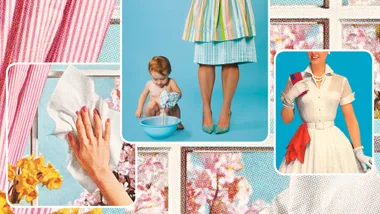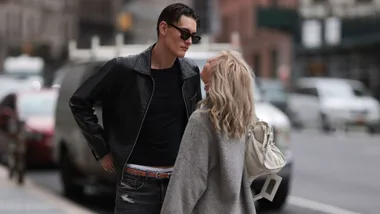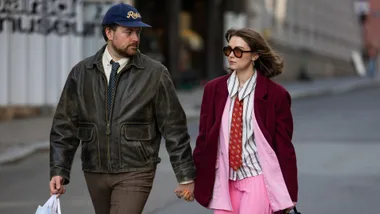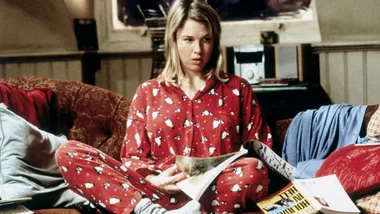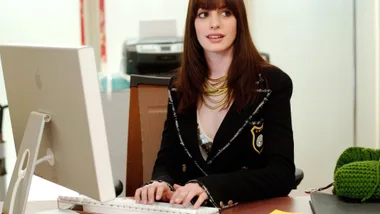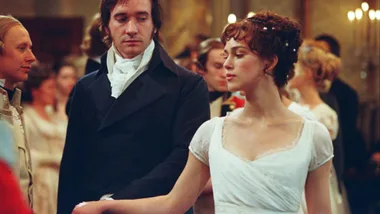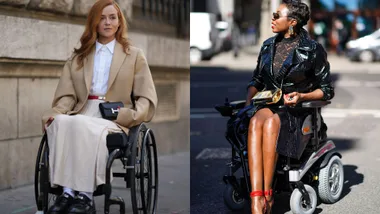She’s the 30-year-old girl-boss who’s built an empire of female empowerment via her dating app, Bumble. And now Whitney Wolfe Herd is fighting to make misogyny illegal.
At the end of every working week, Bumble founder and CEO Whitney Wolfe Herd likes to slow things down for her team. Often this means staying at HQ, a playful midcentury-style pad, to treat the 60-person team based in Austin, Texas, to manicures in the designated Glam Room (which doubles as a nursing haven for new mums).
But today she takes them to the local cinema to see RBG, the documentary about iconic US Supreme Court justice Ruth Bader Ginsburg. The group of staffers, mostly women, fills seats around Wolfe Herd as Betty Boop for President, a slyly subversive black-and-white cartoon, plays before the documentary. The two films are an appropriate combo for this gang: Bumble is nothing if not woman-centric, and its notions of womanhood intertwine strands of the cute with the noble, the ambitious with the decorous, and the feminine with the feminist.
A plate of chicken tenders on her lap, Wolfe Herd visibly relaxes when the lights in the cinema go down. Watching the film, she seems to give herself over to not being Whitney Wolfe Herd, tech start-up mogul. For the first time all day, she’s just a regular 29-year-old girl at the movies.
Teetering between these two worlds has its price. Earlier in the day, soon after we meet, Wolfe Herd breezily says she feels dizzy. “Does that ever happen to you? I think it’s anxiety. I have so much. Yesterday I cried for 20 minutes in my kitchen. Why is that?” Wolfe Herd says she used to try to hide her anxiety, but “if people look at me and think I’ve got it all together, why not tell the truth?
One could forgive Wolfe Herd for feeling a little anxious. She’s running a relationships platform with more than 50 million users globally that is already in the US, Australia, Europe, Canada, Mexico, India, Bali and the Philippines, with plans to expand further into the Asia-Pacific region this year. Wolfe Herd hired former HR manager Michelle Battersby to launch Bumble in Australia in 2016 after being introduced through a mutual friend. “Whitney and I had this strange connection. I had this incredibly strong gut feeling; I knew it was going to be big – and that I wanted to be a part of it,” says Battersby, who is now the associate marketing director of Asia-Pacific, where Bumble has more than two million users.
Bumble BFF, a feature to connect with new friends, has grown faster than any other mode on the app. In April last year, Kris Jenner announced she was using Bumble Bizz, the app’s professional networking service, to hire an assistant. Then, in July, Wolfe Herd joined Imagine Entertainment’s board of directors and, in August, Bumble launched Bumble Fund, a venture-capital arm that invests in women-led businesses. On top of that, Bumble is countersuing Match Group, which owns Tinder, for $572 million. (The legal back-and-forth started in February last year, after Match reportedly said it was interested in acquiring Bumble, which opened its books. When Bumble turned down Match’s acquisition offer, Match sued for alleged intellectual property infringement.) When I met with Wolfe Herd, she was also overseeing the second-floor renovation of her house, and nursing her husband, Michael Herd, an executive at an oil company who recently had follow-up back surgery after surviving a near-fatal car accident in 2017. Oh, and Bumble is getting into the beauty game.
Yes, you read that correctly. Bumble has spent several months working with psychotherapists and dermatologists to make serums that simultaneously solve skin and – according to the company – emotional issues. This year, Bumble will launch two serums with quirky names, such as Break Up With Bad, the line’s facial oil for “break-ups and breakouts”. And that’s just the beginning.
Empowering women is Wolfe Herd’s cornerstone, the motivator that fuels all of her ambitious plans. She says her personal goal is to eradicate misogyny – to make it illegal. When I ask if she thinks it’s truly possible to put an end to a phenomenon that has been around since time immemorial, she looks at me squarely, pauses, and says, “We can try.” It’s why she’s working with legislators to get a bill passed that would make sending unsolicited pictures of genitalia an offence similar to flashing in public. In September, the State of Texas (where Bumble is based) will implement a bill banning people from electronically sharing sexually explicit content without consent; and Wolfe Herd is campaigning to change the law nationally. If a man who has been rebuffed by a romantic interest hostilely sends an “eggplant pic”, Bumble’s coy reference to a “dick pic”, Wolfe Herd wants him to be held accountable. She points to a nearby stop sign. “If you run it, you get arrested. Laws attach consequence.”
So much of Wolfe Herd’s impetus to cast a wide net and make as much impact as possible stems from her life experiences. “They say that the greatest companies in the world come out of someone’s personal heartbreak,” she says. Wolfe Herd famously sued Tinder, which she co-founded, for sexual harassment after being fired in 2014. Though she’s legally barred from discussing the suit, which the two parties reportedly settled for $1.4 million, she does say that five years ago, “it wasn’t #MeToo; it was #MeOnly”. Years before, in her first romance as a teenager in Salt Lake City, she dated someone who “told me what clothes to wear, certain friends to stay away from, how everyone was prettier than me, and then he would disappear for days. Talk to any FBI agent. They’ll tell you the easiest way to torture someone is the silent treatment. It is severe physical and mental torture,” she says. “My mum had to literally intervene. She went to his house and said, ‘Stay away from my daughter.’”
Despite her desire to quash the gender-fuelled behaviour she dealt with as she came of age, Wolfe Herd still straddles the line between the classic and ultra-modern paradigms of womanhood. “Sometimes she wants to be the traditional wife,” says her husband. “She’ll work a 12-hour day and come home. I’ll say, ‘Let’s order in,’ and she’ll want to cook dinner instead.”
Wolfe Herd has cultivated a public persona that screams lovely: think Audrey Hepburn – if Hepburn used terms like “intersectional feminism”. But, her husband adds, “No Harvard Business School tells you how to do what Whitney’s done. She stood up against a multibillion-dollar corporation that had every ability to swallow her up. You don’t leave Exxon and start Chevron. She did. It’s unbelievable. Her ambition, strength and ability to persevere have created so much success.”
Yet Wolfe Herd often tempers that success with a kind of prettiness and accessibility that seem to prove she doesn’t feel times have changed enough –something she discusses regularly with her friend Tyler Haney, the founder and CEO of Austin-based Outdoor Voices sportswear. “Men are expected to be ruthless. They’re allowed to cut people down. I feel like I have this expectation to bend, to fold, to be nice to everyone, and if I’m not I’m labelled a B-I-T-C-H,” says Wolfe Herd. Haney says the performance expectations for men and women are the same, but “there are more eyeballs on our trajectories. More criticism”. It’s why the two spend early mornings paddleboarding on Lake Austin, or playing tennis on her court. “There aren’t many female-founder CEOs. It’s lonely,” says Haney. Having Wolfe Herd as a friend has been helpful both personally and professionally. “My motto is ‘totally possible’. With Whitney, it’s ‘beyond totally possible’. She’s like a queen bee. Her energy attracts people,” says Haney. “Whitney is good at taking care of people. She’s a boss mama.”
A woman pushing boundaries, even if she’s doing so under the cover of beauty and charm, can easily anger a faction of men. In April last year, two months after the Marjory Stoneman Douglas High School shootings in Florida, Bumble banned guns from profile pictures, and Wolfe Herd received an angry email from one man who threatened “to put his Glock and his you know- what in my mouth”, sending a photo of each. Another critic reportedly published false rumours about her, accompanied by her picture and her mobile number, on neo-Nazi site the Daily Stormer in 2017. Bumble received hundreds of messages from men detailing how they wanted to mutilate the female employees and writing that women existed only for their pleasure. The Austin police camped out at Bumble’s offices for a week, and the FBI got involved.
Today, a source close to Wolfe Herd says that her house in a gated community has multiple security systems, Bumble’s new HQ also has full-time security, and Wolfe Herd travels with a bodyguard. Yet all the pushbacks, lawsuits and threats do is motivate her.
Just before Wolfe Herd takes her staff to see RBG, there’s an all-hands meeting at HQ. Everyone gathers in an open space on velvet couches. Wolfe Herd sits just apart and is being videoed for satellite offices – about 30 employees work outside of Texas, in cities such as New York, Paris, Mexico City, London and Sydney – to watch her answer anonymous questions submitted by employees. The last one: what is the future of Bumble? “I fucking love this,” Wolfe Herd says. “I want to take this sucker around the planet. Then, who knows, maybe we’ll work with [Jeff] Bezos and [Elon] Musk and take it beyond.”


